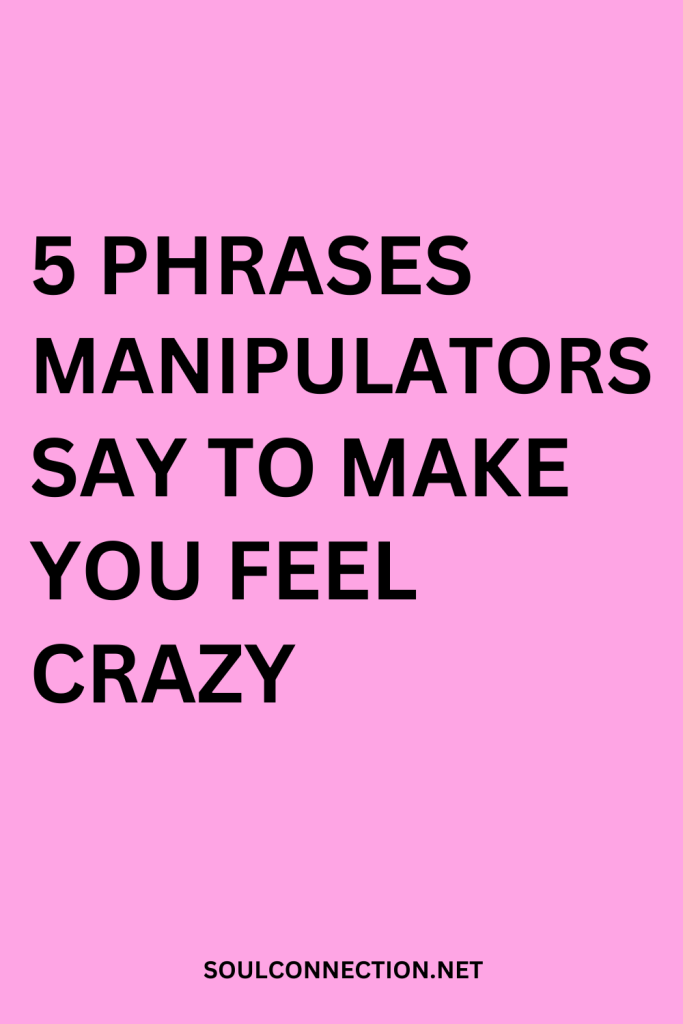Ever had a conversation that left you questioning your own memory, instincts, or honestly—your grip on reality? Pull up a chair.
Manipulators are masters at spinning words that can turn even the most self-assured among us into puddles of self-doubt. It’s not you. It’s them—and their Olympian-level ability to twist, deflect, and gaslight with just a handful of well-practiced phrases.
Not all relationships are created equal, and some come with a side of psychological whiplash.
If you’ve ever wondered why you leave certain interactions feeling out of sorts or even plain bonkers, there’s a good chance some of these classic lines have been lobbed in your direction.
Let’s break down the greatest hits manipulators love to play—so you can spot them, call them out, and keep your sanity safely intact.
1. “You’re too sensitive”
Ah, the instant classic. This phrase is the manipulator’s equivalent of waving a magic wand and making your feelings—poof!—disappear.
Suddenly, your totally reasonable reaction to a hurtful comment or shady behavior is spun as the problem, not what was actually said or done.
This line is a favorite because it puts you on the defensive. Instead of discussing why their actions upset you, you’re now stuck explaining, yet again, why it’s okay to have normal human emotions.
The hidden message here? Your feelings are invalid, and you need to adjust yourself to better accommodate their… charm.
Here’s the trick: When someone tells you you’re “too sensitive,” what they’re really saying is, “I don’t want to take responsibility for how my actions affect you.” Stand your ground.
You’re allowed to feel what you feel. Sensitivity isn’t the problem—lack of empathy is.
2. “I never said that”
Cue the internal panic: Are you losing your mind, or did they just rewrite history in front of your very eyes? The phrase “I never said that” is the gaslighter’s bread and butter.
It’s designed to make you question your memory, your perception, and eventually, your own reality.
Arguing with someone who wields this phrase can feel like wrestling with fog. No matter how many receipts (texts, emails, actual witnesses) you bring to the table, they’ll keep moving the goalposts.
Suddenly, you’re not only hurt, you’re doubting your memory, retracing every step of the conversation, and possibly apologizing for something that didn’t even happen.
Give yourself some credit—your memory isn’t the problem. When this phrase pops up, stop debating the details. State your experience clearly, and if the conversation gets circular, step away.
Life’s too short to play detective in your own relationships.
3. “You’re imagining things”
Translation: “Let me wave away any and all evidence of my behavior, and plant the seed that you’re delusional.” This phrase is cousin to “You’re paranoid” and “You’re making things up.”
Manipulators use it to discredit your intuition, your observations, and sometimes, even your sanity.
Spotting patterns, inconsistencies, or fishy behavior doesn’t mean you’re imagining things—it means you’re paying attention. Manipulators want you to question your gut, because as long as you don’t trust yourself, you’re a lot easier to control.
Trust your instincts. If someone repeatedly tells you you’re imagining things when your spidey sense is tingling, they’re not trying to help—they’re trying to keep you off balance.
Nobody gets to be the sole authority on your reality except you.
4. “Why are you making such a big deal out of this?”
The classic minimizer. This phrase has a way of shrinking your concerns down to the size of a peanut, while making you feel like you’re blowing things wildly out of proportion.
Suddenly, you’re the drama queen or king, and the real issue gets swept under the rug.
This tactic is about dismissing, not discussing. If a manipulator can convince you that your boundaries, feelings, or expectations are “overreactions,” then they never have to take a hard look at their own behavior. Neat trick, right?
Don’t fall for it. If something is a big deal to you, it’s a big deal. Your boundaries matter. Calmly state why this matters and hold your line.
Don’t let anyone convince you that your standards are too high simply because they refuse to reach them.
5. “If you loved me, you’d…”
Hello, emotional blackmail. This sweet little phrase dresses up as intimacy and care, but really, it’s all about control.
Whether it’s “If you loved me, you’d trust me” or “If you loved me, you’d drop your friends/take my side/do exactly what I want,” the message is always the same: Love is conditional, and you’d better shape up if you want to keep it.
Healthy relationships aren’t built on ultimatums, guilt trips, or conditional affection. Manipulators love this phrase because it shifts the blame to you.
Instead of them earning your trust or respect, you’re suddenly the one being tested.
Watch out for “If you loved me” statements, and ask yourself: Is this about mutual care, or is it about someone holding love (or approval, or basic kindness) hostage?
Genuine love doesn’t come with strings attached—or emotional ransom notes.
Reclaiming Your Sanity
Getting wise to these manipulative phrases is like learning to spot a magician’s sleight of hand; once you know the trick, it loses its power.
When you recognize these verbal gymnastics in action, you can stop internalizing the blame and start trusting your own experience again.
Boundaries aren’t just a buzzword—they’re your best armor. Respond with clarity, don’t get sucked into debates about your feelings or reality, and, when needed, step back and give yourself space.
Your sanity is not up for negotiation, and neither is your right to healthy, respectful relationships.
And next time someone tries to make you feel crazy with a few well-placed words, just remember: Wisdom is knowing when to walk away—and when to call out a bad magic trick.


